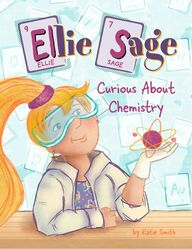
Return to flip book view
Curious About Chemistryby Katie Smith
1Let’s Find Out!About MaterImagine everything around you: your toys, your food, even the air you breathe. All those things are made of matter. That includes you! Matter can be a solid, liquid, or a gas.Matter is made of tiny particles called atoms. Think of atoms like building blocks. They can be put together in millions of dierent ways. When two or more atoms stick together with chemical bonds, they form a molecule.The simplest molecules are made of two or more of the same type of atom. They are called elements. Elements are the foundation for everything in the universe. A substance made of many of the same molecules is a compound. We will be experimenting with compounds you have in your kitchen: baking soda (sodium bicarbonate) and vinegar (acetic acid).You already know one type of molecule—water! Water is made of Hydrogen and Oxygen atoms.H2O
2• Medium-sized balon• 16 oz plastic botle• 1/3 cup (80 ml) vinegar• 3 tsp. (14 g) baking soda• Smal funel• SponLet’s Experiment:Safety Tips:Ask an adult for help.Wear safety goggles.• Pour 1/3 cup of vinegar into the empty botle.• Hold the mouth of the balon open and insert the funel.• Use the spon to pour 3 teaspons of baking soda into the balon.• Shake the baking soda down into the botom bulb of the balon.• Carefuly stretch the balon over the mouth of the botle, keping the balon bulb of to one side, so you don’t dump the baking soda into the botle.
3• Make sure to hold onto the balon at the botle opening.• Tip the balon up and empty the baking soda in al at once.• Watch the balon inflate!• Notice what you se, hear, and smel.When you mixed an acid (acetic acid) and a base (sodium bicarbonate), you created a neutralizing chemical reaction. One of the products of this reaction was carbon dioxide gas (CO2), which inated your balloon. We know a reaction happened because we could see bubbles forming in the bottle, and the balloon inated with a gas. The other products were sodium acetate (NaC2H3O2)—a type of salt—and water (H2O).What a gas!Carbon dioxide is invisible. Each carbon dioxide molecule is made of one carbon atom and two oxygen atoms. It can be a gas, or, it can be solid in the form of dry ice, which is very cold. Carbon dioxide is produced from breathing and from burning certain substances called fossil fuels. Fossil fuels are burned to provide energy for things like cars, houses, and factories.
4Acetic acid: white vinegarAtom: the smallest part of a chemical substanceCarbon: a chemical element found in every living thing on EarthCompound: a pure substance made of the same type of moleculesElement: a molecule that is made of only one type of atomH2O: water moleculeHydrogen: a chemical element that exists as a molecule made of two hydrogen atoms. It is an element in the water molecule: 2 atoms of hydrogen, 1 oxygen (H2O).Matter: anything that can be weighed or measured and takes up space. All matter is made of atoms.Molecule: a particle made of several atoms bonded togetherOxygen: a chemical element that commonly occurs as a gas living things need to breathe. It is an element in the water molecule: 2 atoms of hydrogen, 1 oxygen (H2O).Sodium bicarbonate: baking sodaSodium chloride: table salt (NaCl)Sodium: a chemical element. It is the 6th most abundant element on Earth. It occurs commonly in the form of salts, and is part of the mixture of compounds that make up seawater.Glosary
Notes
Katie Smithkatiesmithdesigns.netm.katie.smith@gmail.comRocky Mountain College of Art+DesignBFA Illustrative Design, 2024Kat Sit